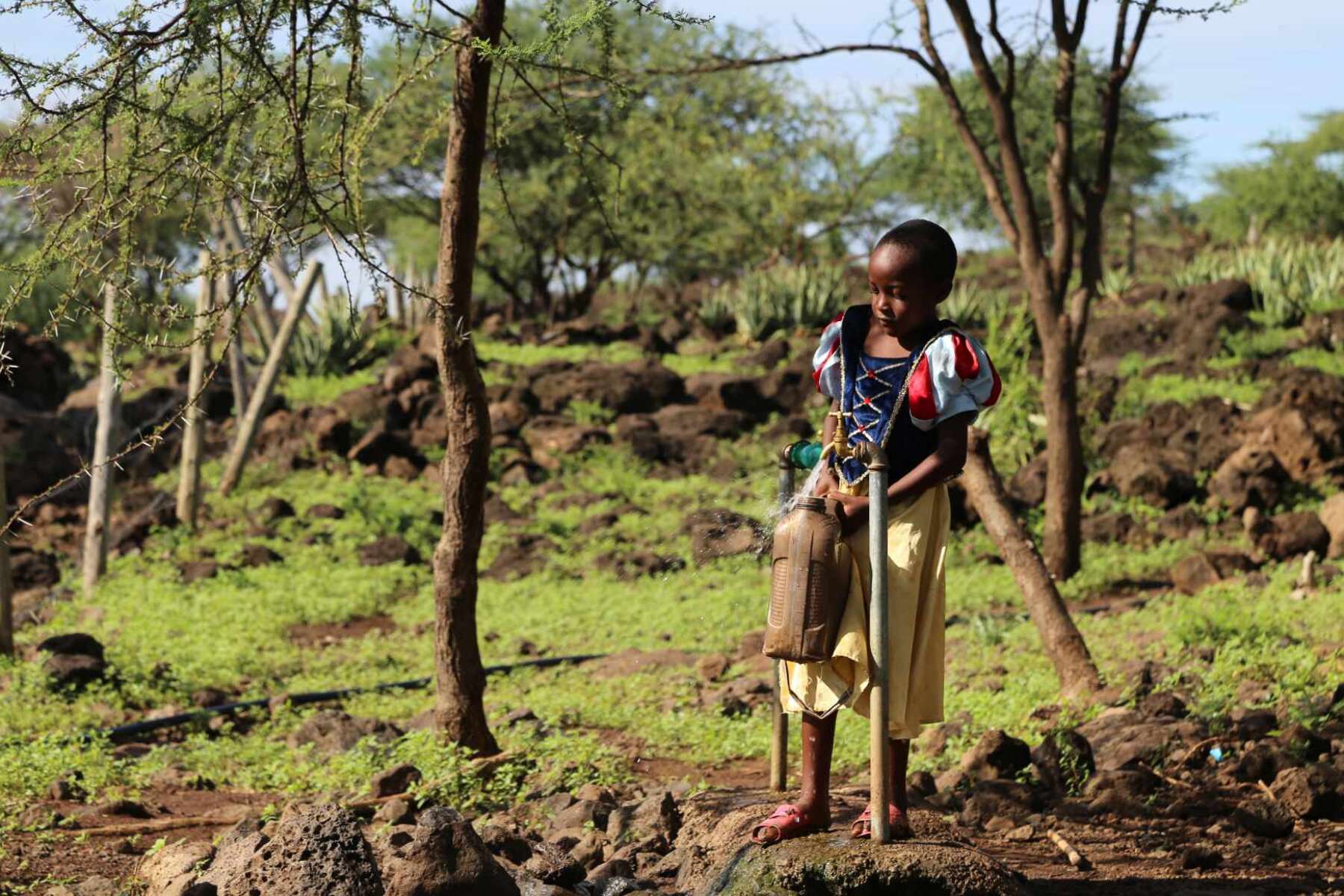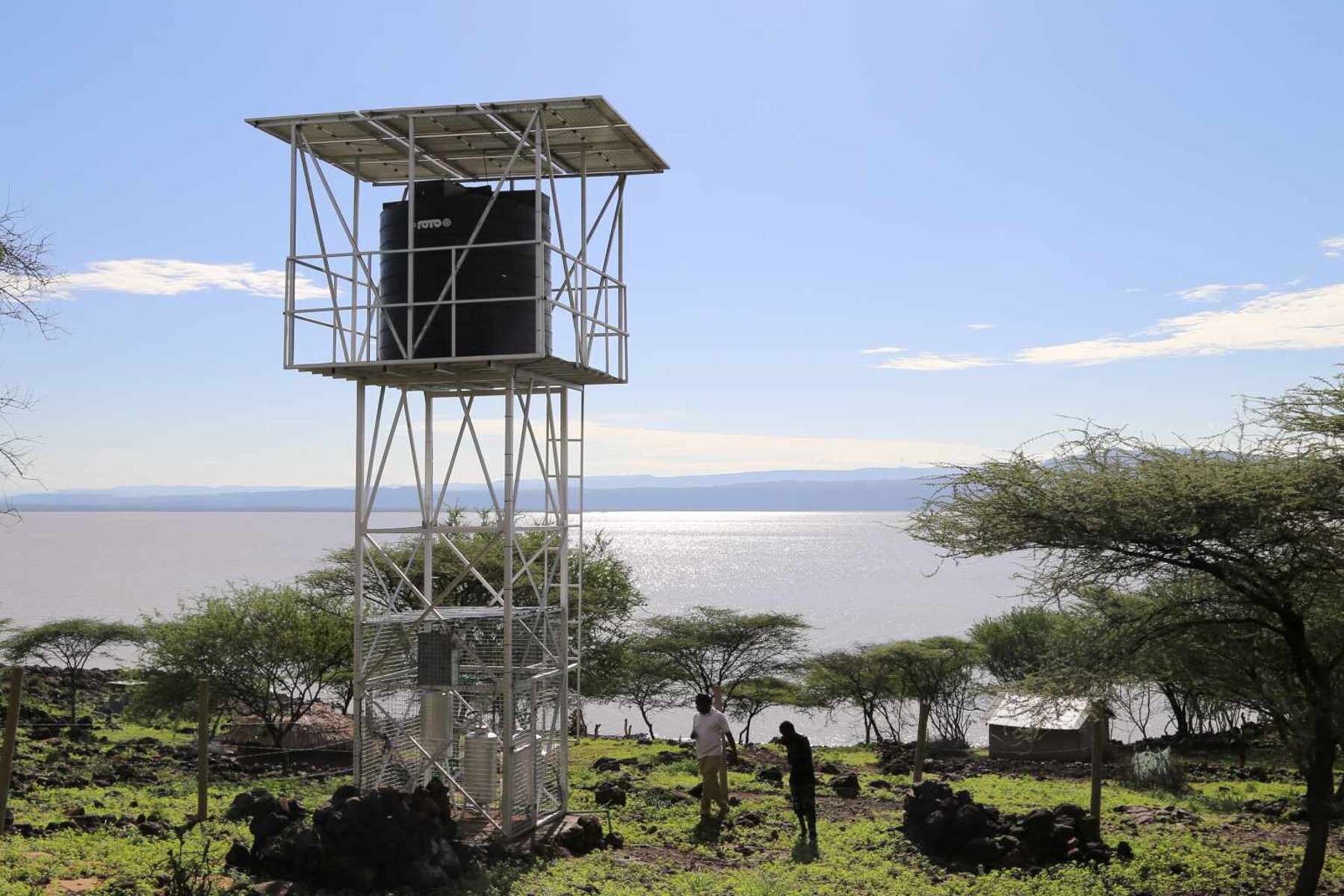
“Our goal: Clean and safe drinking water for all people living by Lake Baringo”
Lake Baringo in western Kenya supplies water to around 4,500 people living in eleven communities. However, it is heavily contaminated with fluoride, which causes discolouration of the teeth and bone deformation. KSB is donating ten UPA pumps to support the installation of filtering systems by the German Moritz-Nepomuk-Stiftung to ensure people living by Lake Baringo have access to safe drinking water.
For several months now, the children in Kampi Ya Samaki in the district of Baringo in western Kenya have been going to primary school for more reasons than learning to read and write. Next to the schoolhouse there is now a small building on which a black water tank and a solar panel are mounted: a water kiosk. The about 300 pupils can fill containers with clean drinking water and take them home with them. A solar-powered KSB pump transports the water from nearby Lake Baringo and feeds it through a filtering system.
Until now, getting safe drinking water was difficult for the people in Kampi Ya Samaki. Not only because there is no public water supply in this Kenyan community, but also because the water in the lake and the groundwater are heavily contaminated with fluoride, which comes from the volcanic rock in the region. “At times, we have measured fluoride levels of between 15 and 20 milligrams per litre in the surface and groundwater. The maximum level recommended by the World Health Organization is less than 1.5 milligrams,” explains Johannes Münz, Managing Director of Harbauer Kenya Water Solutions, a company specialising in removing fluoride from drinking water.
Together with the German Moritz-Nepomuk-Stiftung, Harbauer Kenya plans to install a total of eleven filtering systems on Lake Baringo. KSB is supporting the project by donating ten well pumps from its UPA type series. “I am very grateful for the pumps donated by KSB,” says Münz. “It will enable us to implement the project in a reliable way and guarantee that the local people have access to good quality water.”
Fluoride (F-) is an ion that is added to toothpaste in some regions to strengthen tooth enamel. However, in excessive concentrations it causes patches of brownish-yellow discolouration and malformation of the teeth. In extreme cases, it can lead to severe bone deformation. “The people here suffer from dental fluorosis and even skeletal fluorosis, which is sadly very common in Kenya,” says Münz. For the inhabitants of Lake Baringo, fluorosis is far more than just an aesthetic problem. “People with brown and broken teeth are stigmatised. They can’t work at a hotel reception or even get a job in the army due to the colour of their teeth. They are disadvantaged in numerous ways. We are helping to improve their chances of finding better jobs and therefore a better life,” explains Münz. This mission is all the more serious as people’s income in this area is already very low. “The people who live here depend on subsistence farming, they fish, have cattle, a few goats and keep bees for honey. As the region is very dry, they can't really grow anything.”
Children are particularly badly affected. “While they are still growing, children retain much more fluoride in their teeth and bones than adults,” explains Münz. This is also the reason why Harbauer Kenya installs the filtering stations at schools. Four of the five systems that have already been installed supply primary schools with free drinking water. There is also a water kiosk that is open to the public so that people from the communities can benefit. For a small fee, the entire community can be supplied with filtered and disinfected water. The planning of further filtering stations is already underway. Harbauer Kenya is currently in discussions with other schools and decision-makers to install additional filtering stations and give even more people by Lake Baringo access to clean drinking water.

The filtering station at Kirepare Primary School is located on an island in Lake Baringo. It supplies 250 pupils, parents and teachers with safe drinking water.
The donated UPA pumps take water from the lake and feed it through a pipeline and a sand filter into the high-level tank of the treatment system. The pumps provide sufficient pressure to compensate for the pressure loss caused by the sand filtration and the height difference. From the reservoir, the water flows through the HAPaqua filter material, a white filter granulate synthetically produced by Harbauer Kenya based on hydroxyapatite. One kilogram of the granulate can remove up to 10 grams of fluoride from the water. A UV disinfection unit then eliminates bacteria, viruses and pathogens. The UPA pumps are ideal for use on Lake Baringo. “The pumps are made entirely of stainless steel, which is a non-corrosive material that can therefore handle water with a high fluoride content,” explains Joseph Waweru, Sales Engineer at KSB Kenya.
Implementing the project has not always been easy. The start of the project coincided with an election year in Kenya, which created a tense atmosphere in the country and also led to isolated riots. Now that the election is over, working on the systems is still not without danger for the team on the ground, as there are repeated and sometimes violent conflicts between different ethnic groups fighting over the scarce resources. One of these hard-fought resources is water – which is why Waweru says it is all the more important that Harbauer Kenya and KSB continue to work together to solve at least this problem in the long term.
Despite the ongoing conflicts, Waweru is positive about the future: “The population around the lake is growing, so it’s vital that we continue to drive ahead with the project. And we look forward to doing this together with the Moritz-Nepomuk-Stiftung and Harbauer Kenya to ensure that even more people have access to clean water. Our goal is clean and safe drinking water for all people living by Lake Baringo.”


